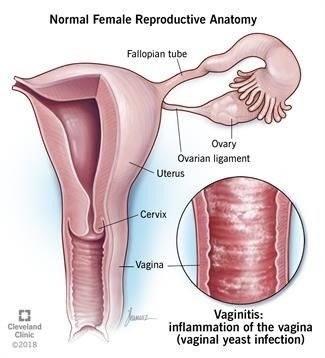By Nnenna Joseph
A yeast infection of the vagina and tissues is at the opening of the vagina (vulva). This type of yeast infection is caused by the fungus candida.
This condition can cause inflammation, intense itchiness, and a thick, white discharge from the vagina. Vaginal discharge that is thick, whitish, looks like cheese & feels like yogurt, is often due to yeast infection. But it can be easily treated.
It is nothing to be ashamed of, it is perfectly normal. Vaginal yeast infection or vulvovaginal candidiasis usually occurs when the healthy yeast that usually lives in your vagina grows out of control. 9 out of every 10 women will have a yeast infection at some point in their life.
Vaginal Birth or Caesarean -Section In the Nigerian Context; Myths and Choices
A vaginal yeast infection isn’t considered a sexually transmitted infection. But, there’s an increased risk of vaginal yeast infection at the time of first regular sexual activity. There’s also some evidence that infections may be linked to mouth to genital contact (oral-genital sex).
What are the causes of a yeast infection?
- Use of antibiotics (which lowers the amount of lactobacillus, the good bacteria in the vagina)
Antibiotics can cause yeast infections in some people because they kill off beneficial bacteria that prevent the overgrowth of yeast in the vagina. Antibiotics attack good bacteria all over your body.
- Douching-
This is a method used to wash out the vagina, usually with a mixture of water and vinegar. A douche is a device used to introduce a stream of water into the body for medical or hygienic reasons, or the stream of water itself. Douche usually refers to vaginal irrigation, the rinsing of the vagina, but it can also refer to the rinsing of any body cavity. Wikipedia
- Hormonal imbalance
Think of hormones like a cake recipe. Too much or too little of any one ingredient affects the final product. Hormones are your body’s chemical messengers.
Produced in the endocrine glands, these powerful chemicals travel around your bloodstream telling tissues and organs what to do. They help control many of your body’s major processes, including metabolism and reproduction.
When you have a hormonal imbalance, you have too much or too little of a certain hormone. Even tiny changes can have serious effects throughout your whole body.
Hormonal imbalances are linked to yeast infections. People are more likely to get candidiasis if they’re pregnant, on hormonal contraception, and around their period.
This is because it disrupts your body’s natural balance of progesterone and estrogen. High levels of estrogen cause Candida fungi to overgrow.
- Anything that weakens your immune system like; diabetes, stress, lack of sleep, pregnancy, HIV/AIDS, etc.
Wearing Unwashed Boxers More Than Two Days Can Cause Fungal Infection – Health expert
What are the symptoms of yeast infection?
Apart from the thick, whitish, cheese-like discharge mentioned earlier, vaginal yeast infection may come with intense itching, redness, irritation, excoriation, or a burning sensation in the vagina.
Yeast infection symptoms can range from mild to moderate and include:
- Itching and irritation in the vagina and vulva
- A burning sensation, especially during intercourse or while urinating
- Redness and swelling of the vulva
- Vaginal pain and soreness
- Vaginal rash
- Thick, white, odor-free vaginal discharge with a cottage cheese appearance
- Watery vaginal discharge

Treatment
- Short-course vaginal therapy. Taking an antifungal medication for three to seven days will usually clear a yeast infection. Antifungal medications — which are available as creams, ointments, tablets and suppositories — include miconazole (Monistat 3) and terconazole. Some of these medications are available over-the-counter and others by prescription only.
- Single-dose oral medication. Your doctor might prescribe a one-time, single oral dose of fluconazole (Diflucan). Oral medication isn’t recommended if you’re pregnant. To manage more-severe symptoms, you might take two single doses three days apart.
See your doctor again if treatment doesn’t resolve your symptoms or if your symptoms return within two months.
If your symptoms are severe, or you have frequent yeast infections, your doctor might recommend:
- Long-course vaginal therapy. Your doctor might prescribe an antifungal medication taken daily for up to two weeks, followed by once a week for six months.
- Multi-Dose oral medication. Your doctor might prescribe two or three doses of antifungal medication to be taken by mouth instead of vaginal therapy. However, this therapy isn’t recommended for pregnant women.
- Azole-resistant therapy. Your doctor might recommend boric acid, a capsule inserted into your vagina. This medication may be fatal if taken orally and is used only to treat candida fungus that is resistant to the usual antifungal agents.
Post Disclaimer
The opinions, beliefs and viewpoints expressed by the author and forum participants on this website do not necessarily reflect the opinions, beliefs and viewpoints of Anaedo Online or official policies of the Anaedo Online.

